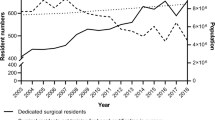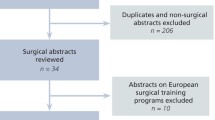Abstract
Background
Increasing concern has been expressed worldwide on the problem of finding young doctors to enter a training programme in an operative speciality.
Materials and methods
A survey comprising 22 questions on working conditions and job satisfaction was placed on the homepage of the Austrian Society of Surgery; 667 questionnaires were completed.
Results
The question whether surgery is threatened by a trainee shortage was answered with “yes” by 68%. Only 37% were satisfied with their working conditions. The majority (61%) specified documentation as making up between 20% and 40% of their workload, 22.5% estimated an even higher percentage. Only 17.7% were satisfied with payment. A clear majority works 60 to 80 h per week or more. Only 32.5% stated that they can leave the hospital in the morning after weekend duty; for night duty during the week, this percentage decreased to just 4.2%. As for surgical training, 33.3% were satisfied. Regular assessments between the trainees and their department heads were confirmed by only 34%. A clear majority (96%) is in favour of rotations in other hospitals during residency for the sake of broader experience.
Conclusion
Working hour restrictions are essential, but not enough: Substantial improvements in the professional profile and in training are required.





Similar content being viewed by others
References
Büchler P, Kraus TW, Friess H, Büchler MW (2003) Labor legislation in the European Union has impact on workforce management in surgical centers. Surgery 134:4–10
Dodson TF, Webb AL (2005) Why do residents leave general surgery? The hidden problem in today's programs. Curr Surg 62:128–131 doi:10.1016/j.cursur.2004.07.009
West D, Codispoti M, Graham T, Specialty Advisory Board in Cardiothoracic Surgery of the Royal College of Surgeons of Edinburgh (2007) The European Working Time Directive and training in cardiothoracic surgery in the United Kingdom. Surgeon 5:81–85
Currie S, Coughlin PA, Bhasker S, Hossain J, Irvine CD, Curley PJ (2007) Vascular surgery is an unattractive career option for current basic surgical trainees: a regional perspective. Ann R Coll Surg Engl 89:792–795 doi:10.1308/003588407X232053
Beger HG, Arbogast R (2006) The art of surgery in the 21st century: based on natural sciences and new ethical dimensions. Langenbecks Arch Surg 391:143–148 doi:10.1007/s00423-006-0039-3
Carpenter RO, Spooner J, Arbogast PG, Tarpley JL, Griffin MR, Lomis KD (2006) Work hour restrictions as an ethical dilemma for residents: a descriptive survey of violation types and frequency. Curr Surg 63:448–455 doi:10.1016/j.cursur.2006.06.003
Schrem H, Machtens S, Kleine M, Mahlke L, Hagl C, Herrmann H, Bauer H (2003) Erste Ergebnisse der Umfrage zur aktuellen Arbeitssituation in den operativen Fächern im Zeitalter des Arbeitszeitgesetzes. Deutsche Gesellschaft für Chirurgie – Mitteilungen 4:377–82
Schröder W, Bollschweiler E, Leers J, Vivaldi C, Hölscher AH (2005) Wo drückt der Schuh?—Umfrage zu aktuellen Problemen junger Chirurg(inn)en in Nordrhein-Westfalen. Deutsche Gesellschaft für Chirurgie – Mitteilungen 1:44–47
Jones AM, Jones KB (2007) The 88-hour family: effects of the 80-hour work week on marriage and childbirth in a surgical residency. Iowa Orthop J 27:128–133
Hutter MM, Kellogg KC, Ferguson CM, Abbott WM, Warshaw AL (2006) The impact of the 80-hour resident workweek on surgical residents and attending surgeons. Ann Surg 243:864–871 doi:10.1097/01.sla.0000220042.48310.66
McGrath JS, Shehata M (1999) Attitudes of surgical trainees towards transplantation surgery as a career. Transpl Int 12:303–306 doi:10.1007/s001470050232
Janssen C, Ommen O, Neugebauer E, Lefering R, Pfaff H (2007) How to improve satisfaction with hospital stay of severely injured patients. Langenbecks Arch Surg 392:747–760 doi:10.1007/s00423-007-0186-1
McKee M, Priest P, Ginzler M, Black N (1991) Which general surgical operations must be done at night? Ann R Coll Surg Engl 73:295–301
Faiz O, Banerjee S, Tekkis P, Papagrigoriadis S, Rennie J, Leather A (2007) We still need to operate at night!. World J Emerg Surg 2:29 doi:10.1186/1749-7922-2-29
Everett CB, Helmer SD, Osland JS, Smith RS (2007) General surgery resident attrition and the 80-hour workweek. Am J Surg 194:751–756 doi:10.1016/j.amjsurg.2007.08.033
Moschos E, Beyer MJ (2004) Resident attrition: is gender a factor? Am J Obstet Gynecol 191:387–391 doi:10.1016/j.ajog.2004.04.017
Manriquez Gilpin M (2005) Residency attrition rate in obstetrics and gynecology: are we losing more postgraduates today? Am J Obstet Gynecol 193:1804–1806 doi:10.1016/j.ajog.2005.07.083
Kusuma SK, Mehta S, Sirkin M, Yates AJ, Miclau T, Templeton KJ et al (2007) Measuring the attitudes and impact of the eighty-hour workweek rules on orthopaedic surgery residents. J Bone Joint Surg Am 89:679–685 doi:10.2106/JBJS.F.00526
Carlin AM, Gasevic E, Shepard AD (2007) Effect of the 80-hour work week on resident operative experience in general surgery. Am J Surg 193:326–329 doi:10.1016/j.amjsurg.2006.09.014
Walter AJ (2006) Surgical education for the twenty-first century: beyond the apprentice model. Obstet Gynecol Clin North Am 33:233–236 doi:10.1016/j.ogc.2006.01.003
Franzese CB, Stringer SP (2007) The evolution of surgical training: perspectives on educational models from the past to the future. Otolaryngol Clin North Am 40:1227–1235 doi:10.1016/j.otc.2007.07.004
Tan TC, Tan KT, Tee JC (2007) An end to “See one, do one and teach one” residency training programme—impact of the training, education, surgical accreditation and assessment (TESA) programme on medical care and patients’ safety. Ann Acad Med Singap 36:756–759
Ibrahim S, Tay KH, Lim SH, Ravintharan T, Tan NC (2008) Analysis of a structured training programme in laparoscopic cholecystectomy. Langenbecks Arch Surg 2008, Jan 10. doi:10.1007/s00423-007-0269-z
Hassan I, Koller M, Kluge C, Hoffmann S, Zielke A, Rothmund M (2006) Supervised surgical trainees perform thyroid surgery for Graves’ disease safely. Langenbecks Arch Surg 391:597–602 doi:10.1007/s00423-006-0077-x
Jurgaitis J, Paskonis M, Mehrabi A, Kashfi A, Gragert S, Hinz U et al (2006) Controlled-surgical education in clinical liver transplantation is not associated with increased patient risks. Clin Transplant 20(Suppl 17):69–74 doi:10.1111/j.1399-0012.2006.00603.x
Krones CJ, Schröder W, Ansong J (2006) The surgery assistant in graduate education. Personal requirements and expectations of graduate education faculty and graduate education schools. Chirurg Suppl, pp 303–305
Büchler P, Martin D, Knaebel HP, Büchler MW (2006) Leadership characteristics and business management in modern academic surgery. Langenbecks Arch Surg 391:149–156 doi:10.1007/s00423-006-0040-x
Schürer S, Schellberg D, Schmidt J, Kallinowski F, Mehrabi A, Herfarth C et al (2006) Evaluation of traditional German undergraduate surgical training. An analysis at Heidelberg University. Chirurg 77:352–359 doi:10.1007/s00104-005-1123-x
Somaseker K, Shankar J, Conway KP, Foster ME, Lewis MH (2003) Assessment of basic surgical trainees: can we do more? Postgrad Med J 79:289–291 doi:10.1136/pmj.79.931.289
Ansorg J, Hassan I, Fendrich V, Polonius MJ, Rothmund M, Langer P (2005) Qualität der Chirurgischen Weiterbidung in Deutschland. Dtsch Med Wochenschr 130:508–513 doi:10.1055/s-2005-863084
v. Frankenberg M, Schmitz-Winnenthal H, Bornemann T, Köninger J, Büchler MW (2007) Project “Partnership”—university surgical departments and hospitals for basic and regular medical care. Directing cooperation for the future. Chirurg 78:368–73
Author information
Authors and Affiliations
Corresponding author
Rights and permissions
About this article
Cite this article
Cerwenka, H., Bacher, H., Werkgartner, G. et al. Working conditions and trainee shortage in operative disciplines—is our profession ready for the next decade?. Langenbecks Arch Surg 394, 179–183 (2009). https://doi.org/10.1007/s00423-008-0356-9
Received:
Accepted:
Published:
Issue Date:
DOI: https://doi.org/10.1007/s00423-008-0356-9




